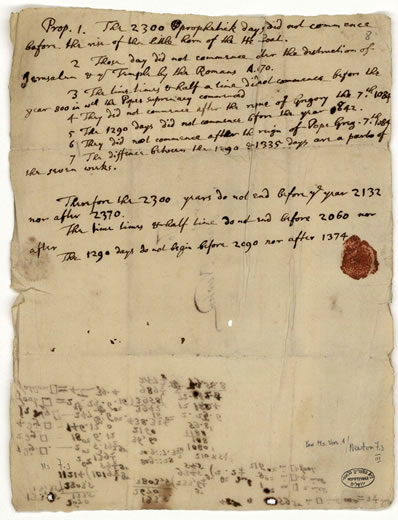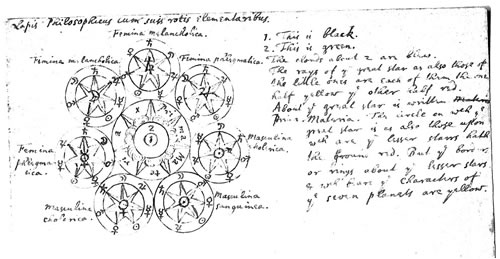
Quick Facts
- NAME: Isaac Newton
- OCCUPATION: Philosopher, Mathematician, Astronomer, Physicist
- BIRTH DATE: January 04, 1643
- DEATH DATE: March 31, 1727
- EDUCATION: The King’s School, University of Cambridge, Trinity College
- PLACE OF BIRTH: Woolsthorpe, Lincolnshire, England, United Kingdom
- PLACE OF DEATH: London, England, United Kingdom
- FULL NAME: Sir Isaac Newton
- AKA: Isaac Newton
- IQ: It’s complicated. What Was Isaac Newton’s IQ?
Best Known For
- Discovering gravity.
- Founding father of physics and calculus.
Honors awarded to Isaac Newton
- 1667 — Fellow of Trinity College, Cambridge
- 1669 — Lucasian Professor of Mathematics at Cambridge (a position now held by Stephen Hawking)
- 1672 — Fellow of the Royal Society
- 1689 — Member of Parliament representing Cambridge
- 1699 — Master of the Mint
- 1701 to 1702 — Member of Parliament for the second time
- 1703 to 1727– President of the Royal Society of London, the United Kingdom’s national academy of science
- 1705 — Knighted
- Lunar features: “Crater Newton”
- Paris street name: Rue Newton (16th Arrondissement)
Fun Facts
-
Nearly Died as a Baby
Isaac Newton was born prematurely and wasn’t expected to live. His mother even said that Isaac was so small that he could have fit inside a quart mug. (Source: Isaac Newton’s Early Years [wiki])
-
Newton Almost Became a Farmer
He was born into a family of farmers and would have kept that as his career were he not so bad at it. Luckily, his uncle encouraged him to attend college, and he went off to Trinity College in Cambridge instead. (Source: Isaac Newton’s Early Years [wiki])
-
The Truth Behind the Apple Story
Newton himself often told the story of how watching an apple fall off a tree aided his understanding and discovery of the law of gravitation. While many claimed that the apple story was a myth, many of Newton’s acquaintances confirm the incident including Voltaire who wrote in his Essay on Epic Poetry (1727), “Sir Isaac Newton walking in his gardens, had the first thought of his system of gravitation, upon seeing an apple falling from a tree.”
-
Newton was Secretive
While Newton made numerous revolutionary discoveries and inventions, most all his discoveries were made in a short period of six years between ages 21 and 27. His work on optics for example, was completed by age 27 but never even presented until he was 30 after being elected a fellow of the British Royal Society. (Source: Hart, Michael. (1998) The 100: A Ranking of the Most Influential Persons in History)
-
Newton was Deeply Religious …
Newton’s work, particularly the laws of motion and universal gravitation, had been used by some people to argue against the existence of God. Newton himself, however, said:
“Gravity explains the motions of the planets, but it cannot explain who set the planets in motion. God governs all things and knows all that is or can be done.”
“This most beautiful system of the sun, planets, and comets, could only proceed from the counsel and dominion of an intelligent Being. … This Being governs all things, not as the soul of the world, but as Lord over all; and on account of his dominion he is wont to be called ‘Lord God’ [pantokrator], or ‘Universal Ruler’. … The Supreme God is a Being eternal, infinite, absolutely perfect.”
“Opposition to godliness is atheism in profession and idolatry in practice. Atheism is so senseless and odious to mankind that it never had many professors.” (Source:Isaac Newton’s Religious Views [wiki])
-
…But, He Didn’t Believe in Satan or the Holy Trinity
In spite of his deep religious conviction, Newton was unorthodox when it comes to his belief of the devil, spirits and ghosts. He also assailed people who claimed to be tempted by personal demons as deluded by their own imaginations.
This might seem like a reasonable position for a man of science, but in that era, the reverse was actually true: most learned men believed in the existence of Satan, and considered Newton’s view as blasphemous. (Source: Snobelen, Stephen D. (2002) Lust, Pride and Ambition: Isaac Newton and the Devil. Link)
Newton also wrote a thesis arguing against the Council of Nicaea [wiki] and the Church’s doctrine on the Holy Trinity. Realizing that his position would not be accepted by the public, Newton never published this thesis in his lifetime. Indeed, it was released 27 years after his death. (Source: Isaac Newton’s Religious Views [wiki])
-
Newton Was Obsessed with the Bible
 Newton’s note with the date 2060 as the earliest possible date of the Armageddon.
Newton’s note with the date 2060 as the earliest possible date of the Armageddon.The Bible was Sir Isaac’s greatest passion – he wrote more about religion than about science and mathematics! Indeed, Newton calculated the date of the Crucifixion of Jesus Christ as April 3, A.D. 33 and the earliest date of the Apocalypse as 2060 A.D.
Whether you believe that Newton is right or wrong about the end of the world, consider another one of his predictions that came true: that the Jews would return to Israel.
Newton actually did more than just calculate the date of Crucifixion and the coming Apocalypse – his obsession was trying to find hidden meanings in the Bible. Indeed, Newton learned Hebrew, spent half his life, and devoted much more time to this pursuit than to science. (Source: Armageddon Online)
-
Newton was an Alchemist
 Newton’s alchemy notes (Image Source: R. D. Flavin)
Newton’s alchemy notes (Image Source: R. D. Flavin)A recently rediscovered papers of Newton revealed his secret interest in alchemy (of turning base metal into gold) and that he wrote extensively about his experiments:
Newton’s alchemical studies were kept secret during his lifetime. The making of gold and silver was a felony under an act of 1404.
Newton was a creature of his time when many scholars believed in a philosopher’s stone that could transmute base metal into gold. They tended to record their studies in wilfully obscure language.
“Give me leave to assert as my opinion,” wrote the man who identified the wave nature of light and formulated the laws of motion, “that it is effectual in all the three kingdoms & from every species may be produced when the modus is understood: only mineralls produce minerals & sic de calmis. But the hidden secret modus is Clissus (1) Paracelsi (2) wch is nothing else but the separation of the principles thris purification & reunion in a fusible & penetrating fixity,” Newton wrote. (Source:Guardian)
-
Newton Battled Counterfeiters
In 1696, Newton became a warden of the London Mint and was given the task of stopping counterfeiting, which was rampant in those days:
He gathered much of that evidence himself, disguised, while he hung out at bars and taverns. For all the barriers placed to prosecution, and separating the branches of government, English law still had ancient and formidable customs of authority. Newton was made a justice of the peace and between June 1698 and Christmas 1699 conducted some 200 cross-examinations of witnesses, informers and suspects. Newton won his convictions and in February 1699, he had ten prisoners waiting to be executed. He later ordered all records of his interrogations to be destroyed. (Source:Wikipedia)
-
Newton the Politician Uttered Just One Sentence
Newton was elected as a Member of Parliament in 1689 and served for exactly one year. During that time, he said one and only one sentence during the lengthy proceedings: he asked a nearby usher to close an open, drafty window! (Source: Michael White (1998) Isaac Newton: The Last Sorcerer)
Source: http://www.neatorama.com/2007/08/08/ten-strange-facts-about-newton/
